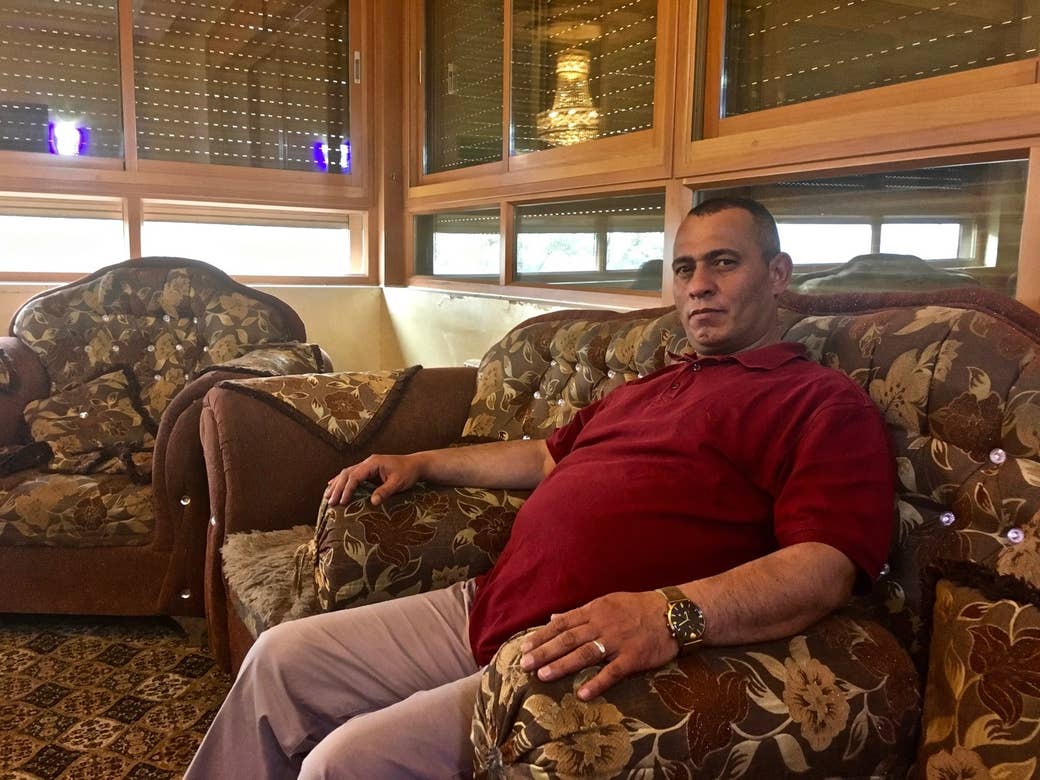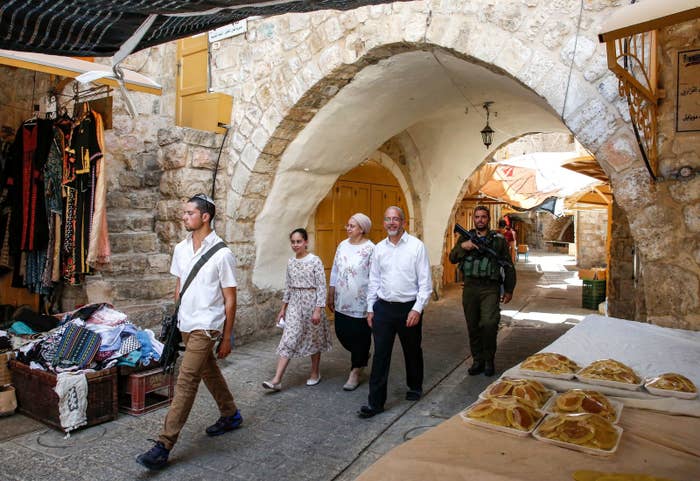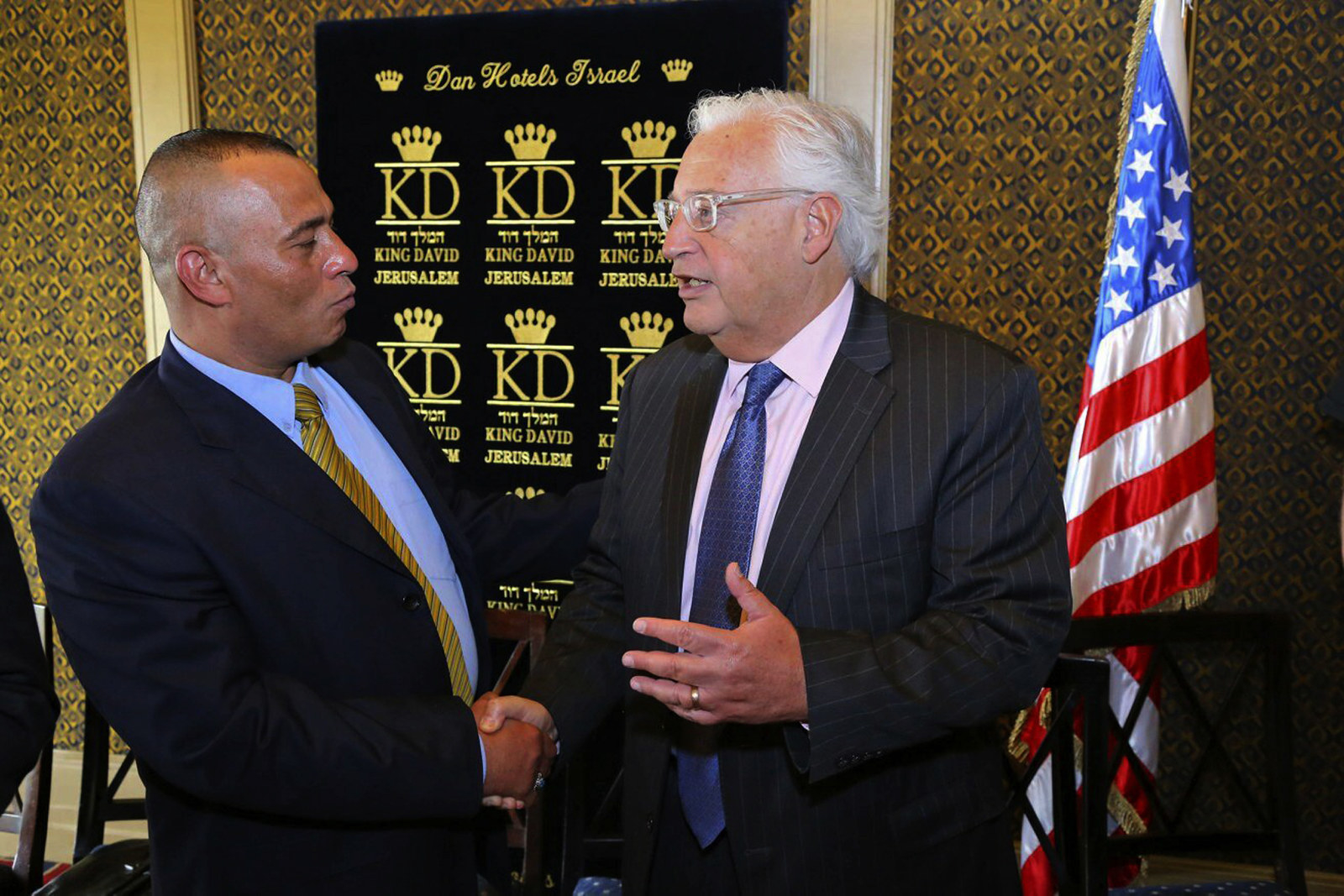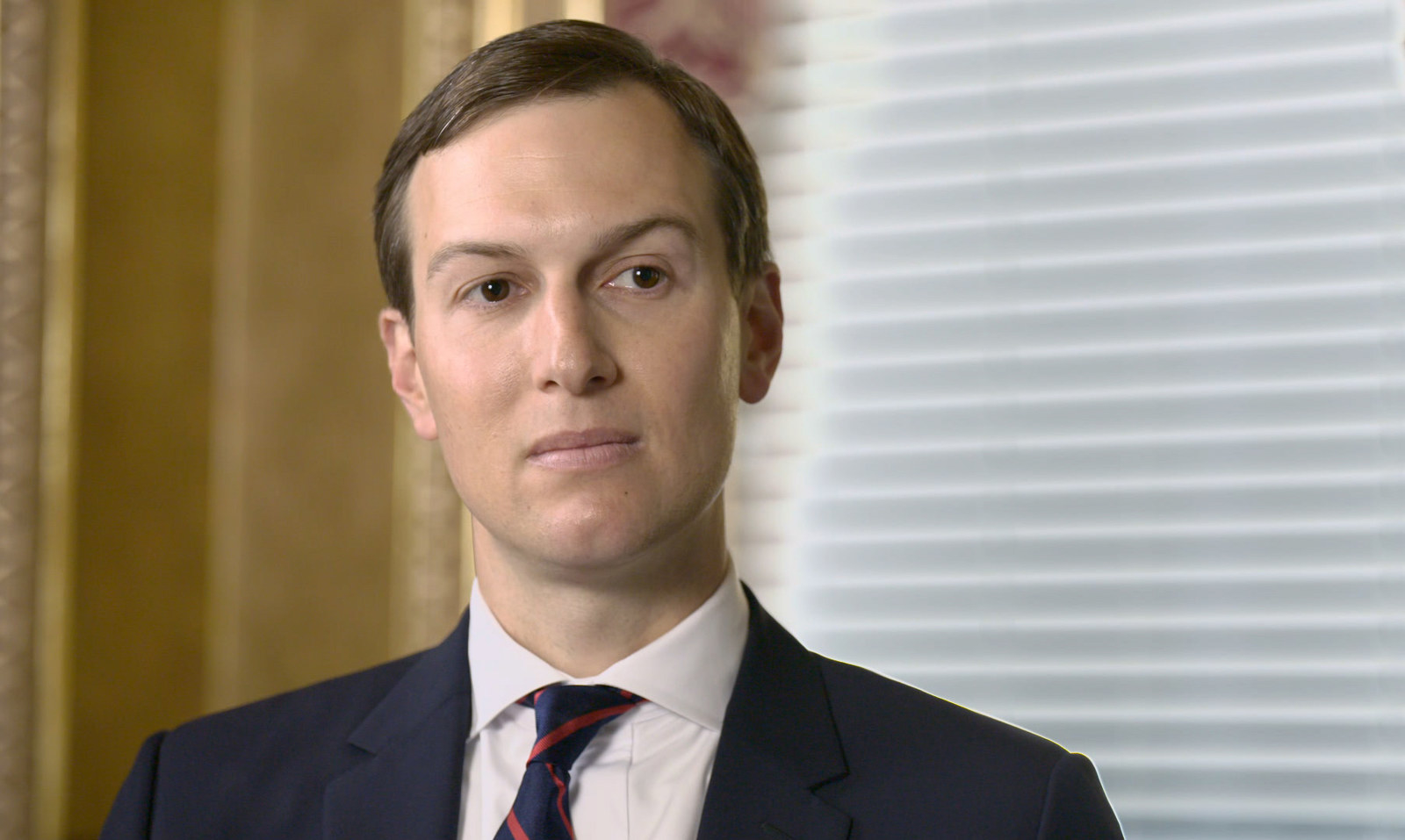
HEBRON, West Bank — When American and Arab business leaders gather in Bahrain later this month to kick off Jared Kushner’s long-awaited Middle East “peace plan” there will be exactly one Palestinian in attendance so far.
He is not a member of the Palestinian Liberation Organization, whose DC office President Donald Trump closed down. Nor does he belong to the Palestinian Authority, to which the Trump administration has cut off funding. In fact, he doesn’t belong to any long-standing Palestinian political or business institutions — and that’s precisely the point.
Ashraf al-Jabari, 45, is a man befitting the Trump show, the kind the president has cultivated around the country and now the world. He’s a largely unknown businessperson on the political fringe, a former member of Palestinian intelligence, bringing to Bahrain some heavy baggage with his questionable alliances and business practices and a whiff of scandal — including a charge of treason filed against him in his hometown. He roundly denied the charge as a conspiracy against him by the Palestinian leadership.
Jabari may turn out to be just a cursory character riding on the coattails of the Trump administration, but he’s managed to catch its attention at a key time, as it’s worked to sideline any Palestinian leadership and institutions while forging ahead with a peace plan that is, in theory, designed to end the stalemate in the Middle East, but that critics say has been biased in Israel’s favor from the start.
All major Palestinian businesspeople, including those with a history of working with Israel, have rejected invitations to attend the Bahrain conference, a “Peace to Prosperity Workshop” meant to raise $50 billion or more, according to news reports, to boost the Palestinian economy. Kushner is billing this as the first step in a so-called "Deal of the Century," with a political plan due to be unveiled at an unspecified time in the future, a timeframe that’s even more uncertain after a new Israeli election was called for later this year. The developments come after two years of Trump’s team specifically sidelining Palestinian institutions, and Palestinians are responding in kind. The Palestinian businessmen boycotting say the conference is a political farce based on an improbable equation: improving the Palestinian economy without addressing the Israeli occupation of it.
That’s where Jabari comes in. He’s mostly unknown among Palestinians, but has been on the Trump administration’s radar since at least 2017. Just last month, he drew praise from the US envoy to the Israelis and Palestinians on Twitter.
“Thank you Ashraf Jabari for your open minded approach to our upcoming econ workshop. Couldnt agree more w you,” US envoy to the Middle East Jason Greenblatt tweeted last month when Jabari announced he’d be attending.
In an interview with BuzzFeed News, Jabari rejected accusations that the conference is “conspiratorial” against Palestinian interests. He later claimed that 13 Palestinian businesspeople would be attending, though he refused to name them.
“We will take what achieves the interests of the Palestinian people and leave behind what does not agree with the Palestinian people,” Jabari told BuzzFeed News. “No one is forcing us to do anything.”
The flailing Palestinian economy could certainly use the cash. And it’s not like the international aid-dependent PA is much loved by Palestinians in the West Bank, where its semiautonomous rule has been in place in parts of the territory since the mid-90s. These days, people are hungry for new leadership and quick to criticize the increasingly heavy-handed Palestinian Authority for corruption, nepotism, and inaction, while calling on PA President Mahmoud Abbas, who is 83 and serving his 14th year of a nominally four-year term, to resign. Just this week, leaked documents showed that the PA had secretly given ministers a 67% pay hike despite a shortage of cash throughout the West Bank.
Kushner and the Trump administration may feel they’ve tapped into that sentiment with their plan. “The hope is that they over time will become capable of governing,” Kushner told Axios in an interview Sunday. But that’s not the hope that Palestinians are looking toward the US to fill.
Rather, there are countless other Palestinians working for change and reform from within. But unlike Jabari, their visions — which include ending the Israeli occupation and equal rights for Palestinians as the starting point for change — don’t align with what the Trump administration wants to see. That shared view of the future presents a potentially lucrative opportunity for Jabari and his Israeli associates.

Until recently, Jabari was largely unheard of outside the West Bank city of Hebron, where his large extended family is based. The city is under Palestinian control, but Jabari lives in a part of town where Israel controls security and Israeli soldiers patrol some streets where Jewish settlers live.
Jabari drives a BMW, and his house, where he grew up, looks like a standard upper-middle class Palestinian home, with an room of worn couches and shiny chandeliers to welcome guests. Also in attendance at the interview last month was Yizhak Magrafta, an Arabic-speaking Israeli activist in Hebron from Tel Aviv who said he now works with Jabari. Magrafta occasionally interjected to try to steer the conversation back to his main talking point: the abuses of the Palestinian Authority, which he at one point likened to ISIS.
Jabari said that he worked in the Palestinian security services from 1995 to 2009, including several years as chief of security for his brother, Arif al-Jabari, who served for a time as governor of Hebron. After leaving the security services, Jabari began work importing nutritional items into the West Bank, as well as some car sales, he said.
It was around this time that Jabari started to do more business with Israeli partners and more publicly engage with Israeli settlers. It’s actually not uncommon for Palestinian businesspeople to engage with Israelis — Israel controls imports in and out of the occupied West Bank, so connections are often needed to navigate the bureaucracy — but to so publicly engage with Israeli settlers who’ve occupied land Palestinians claim for a future state is a thick red line for the community. It also complicates the efforts of Palestinians looking to build bridges with more moderate Israelis.
If Palestinians do know Jabari, it’s likely through the photos of him with settler activists that have circulated online, like from when he spoke at a panel titled, “Enough with the corrupt leadership of the Palestinian Authority. We want to live under Israeli Sovereignty!” at a far-right conference in Israel in 2017.
“We accept what the Israeli government accepts regarding sovereignty in the West Bank,” he told the conference. “And regarding voting in the Knesset [Israel’s parliament], we are in no hurry on this matter… We may come to an agreement on this” in 5 or 10 years. “If the government of Israel decides to go in this [annexation] direction, there is no one who can prevent or stop Israel.” The audience clapped.
Having found his crowd, Jabari teamed up with an American Israeli businessperson and entrepreneur named Avi Zimmerman to colaunch the Judea and Samaria Chamber of Commerce and Industry. Judea and Samaria are the biblical Jewish names for the present-day West Bank, used by Israeli government institutions and rejected by Palestinians as erasing Palestinian claims to the land. It was in his capacity as cofounder that he first met David Friedman, the US ambassador to Israel and a close ally of President Donald Trump’s.
The chamber works “to coalesce and promote the business in the region,” according to its website. Jabari said that so far this year the chamber has secured 1,500 permits for Palestinians to work in Israel and resolved hundreds of thousands of shekels’ worth of financial disputes between Israeli and Palestinian businesses.
All along, Jabari kept his distance from the Palestinian authorities and any political movements against the Israeli occupation. This May, he announced he would be founding a new political party called Reform and Development, though he has yet to register it with the PA, a legal requirement for existing as a political party.
“For now our focus is on the economy,” he told BuzzFeed News, a position that’s in line with the Trump administration’s “economic peace” approach. “We don’t have a political orientation.”
One thing is clear: Like the Trump team, Jabari sees the Palestinian Authority as his biggest foe. The PA doesn’t “want there to be another party except for them speaking about the affairs of the Palestinian people, especially not their mistakes,” he told BuzzFeed News. “They don’t want anyone to speak about their theft, their misdeeds, the money that they stole from the Palestinian people. So they accuse anyone who tries to condemn them.” He even claimed to have files documenting years of PA corruption and wrongdoing, though he denied requests to view the documents. Magrafta in turn likened the PA to Nazis, citing in part the PA’s long-standing policy of paying salaries to Palestinians jailed in Israel or killed while attacking Israelis.
Jabari said he wants peace, prosperity, and dignity for his people, but is less interested in talking about the actual political considerations of what that looks like for Israelis and Palestinians.
He told BuzzFeed News that he supports both a two-state solution and a one-state solution — just as Trump said he did two years ago. Jabari said he preferred two states — an independent Palestine living alongside Israel — but, like many Palestinians, he didn’t see that happening now. In that case, he said he’d support a one-state solution — though he said he also didn’t see that materializing for a while either and wouldn’t make demands on what kind of rights Palestinians would have and when in this scenario.
His politics are just vague enough to be the only Palestinian businessperson heading to a conference whose planners hope will raise tens of billions of dollars for Palestinians, Egypt, Jordan, and Lebanon. And at a time when the Trump administration is in need of willing partners to accept funds, he’s conveniently close with “apolitical” projects that don’t speak about the occupation and are just the kind Kushner’s crowd is looking to prop up.
One potential outgrowth of the Judea and Samaria Chamber of Commerce model is Israeli settlements and sovereignty expanding in the West Bank, while local Palestinian leaders serve as the go-betweens for Palestinian and Israeli business. Palestinian analysts interviewed compared it to Israel’s failed “Village Leagues” in the 1970s and 1980s: In an attempt to sideline the PLO, Israel supported heads of large families in various villages and cities. The plan did not dampen Palestinian nationalism, which instead in the 1990s burst onto the scene in the first intifada, or uprising.
“It’s so interesting watching history repeat itself,” said Diana Buttu, a former spokesperson for the PLO. “They are going to look for the Ashraf Jabaris of this world… They are not willing to work on what Palestinians want: Freedom.”

To his detractors, Jabari is a lone actor not to be trusted for his close ties to pro-settlement Israelis and, intentionally or not, serving as a fig leaf for plans to extend Israeli sovereignty over the West Bank and thereby nullify the decadeslong struggle for Palestinian rights. To his advocates, including those inside the Trump administration, he is the lone brave Palestinian willing to take on the failing policies of the Palestinian leadership and publicly engage with Israelis while working on a practical plan to tackle economic problems for Palestinians — and then deal with the stickier political issues around Palestinian sovereignty.
“The Americans, and the Israelis and the settlers chose someone who everyone sees in Hebron as a person acting out of law, out of traditions, out of norms,” said Issa Amro, the head of Youth Against Settlements in Hebron, who has been arrested by both Israelis and Palestinians for his activism. “Choose someone at least who has education, experience, and clean hands… They didn’t find any other partner?”
Jabari’s supporters emphasize his business acumen, but over the last over decade, he’s also faced two dozen accusations of issuing faulty checks and bank notes, according to a list of cases from the Palestinian High Judicial Authority in Ramallah viewed by BuzzFeed News. Six cases have been settled, four withdrawn, one deferred, and the rest left unresolved. The cases have likely hurt his reputation for being trustworthy among Palestinians. There is, though, one more serious charge against Jabari filed by Hebron’s prosecutor in 2018: treason, for passing along information that violates national security. This case is still open.
Jabari denied the charges when asked about them and dismissed all of the claims as meaningless and a typical Palestinian Authority set-up against him “because of my political relationship with the Jews,” he said, referring to Jewish Israelis. He offered no physical evidence of this to BuzzFeed News and said his accusers, including one who BuzzFeed News spoke with, were part of the campaign against him. Regarding the treason case, he said his accuser had told him he had been coerced by the PA police. Jabari several times said he would share his lawyer’s contact information with BuzzFeed News and did not. He then accused BuzzFeed News of threatening him and being sent by “trouble makers.” He also urged any accusers to come speak with him in his home.
The Palestinian leadership and current governor of Hebron, Jibril al-Bakri, declined to comment on Jabari.
One person who has commented is Jabari’s brother, Arif al-Jabari, the former governor, who has disowned his brother publicly for his political alliances and business practices. Last month he did so again in an interview with local news channel Wattan TV. He said his brother’s actions “did not represent any person” in the family, called his brother “an outlaw” and “deceitful” over financial obligations, as well as “a fugitive from Palestinian justice.”
Speaking to BuzzFeed News, Jabari denied his brother’s accusations and called him a liar. He said Arif, as a PA employee, was under pressure to say these things and had privately walked them back to him and the family.
Reached by phone while traveling, Arif declined to comment further other than saying Ashraf did not represent the family and referred BuzzFeed News to his initial interview.
This isn’t just the airing of family drama. Part of Jabari’s branding is that he comes from a powerful family in Hebron and can deliver his people. At meetings with settlers he’s even been referred to as a sheikh, denoting a high community and familial status. But, as the Israelis found with the Village Leagues’ failure, Palestinian family ties no longer suffice as a main source of political power — especially not at the expense of larger national movements.

No one knows yet exactly what will be on the table at the Bahrain conference. In leaked tapes released to the Washington Post on Sunday, Secretary of State Mike Pompeo called the still-secret Trump peace plan “unexecutable.” Trump himself replied, “I think we have a good chance, but we’ll see what happens,” and urged Israel to fix its “messed up” election crisis, which could derail the administration’s timeline and chances as well. Kushner in turn said it was a “high bar” for Palestinians to ask for freedom from Israeli intervention in a televised interview Sunday.
Some Israel–Palestine analysts have predicted that if and when Trump’s peace plan fails, the Israeli government will go ahead on its own and annex parts of the West Bank, as Israel’s Prime Minister Benjamin Netanyahu has pledged.
In that case, the US administration would consider “what would be the best ways to achieve the outcomes that we think are in America and Israel’s best interests,” Pompeo said, according to the leaked tapes.
Either way, Jabari is definitely on the administration’s radar — to what consequence is yet to be known.
At a recent talk put on in Jerusalem by an Israeli advocacy group, Zimmerman, the cofounder of the Judea and Samaria Chamber of Commerce, said that he’s discussed the chamber’s work with the White House and “it’s on their radar.” Zimmerman claimed that a visit to the White House was also under discussion, but the White House declined to comment on the record.
Last month, Jabari hosted the Chamber of Commerce in Hebron for a kosher Ramadan breakfast meal cooked in the nearby Kiryat Arba settlement. Jason Greenblatt, the US envoy to Israel and the Palestinians, praised the gathering on Twitter, saying “Groundwork for peace indeed! A wonderful example of what could be possible.”
Last February, Friedman, the US ambassador, praised Jabari at an event they both attended as a “proud” friend, “a man of courage and vision who is practical but committed to peace and to coexistence,” and said that the US “couldn’t ask for a better partner in this effort.”
Jabari told BuzzFeed News that he has met the US ambassador “many times” since 2017 through his Israeli–Palestinian economic work, but said the two do not discuss politics. (The US Embassy in Jerusalem declined to comment on the relationship or meetings between the two.)
None of this official American praise of a man Palestinians don’t even know comes as a surprise to Buttu, the former spokesperson for the PLO.
The Americans are “looking for people to confirm their already biased stance,” she said. She criticized the US’s “patronizing” approach during the years of negotiations she was privy to. “They always try to tell us that they know what’s better for us than we [Palestinians] know,” she said. “Rather than changing their approach… they are looking for people that meet exactly their opinion.”

